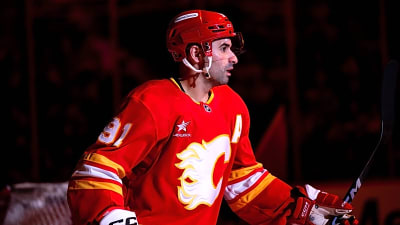
There’s been a lot of speculation about what the Toronto Maple Leafs‘ lines might look like this fall. With so many new faces and lingering questions, both general manager (GM) Brad Treliving and head coach Craig Berube have decisions to make.
Just for fun, we decided to take a different approach: What if the forward lines and defensive pairings were determined by salary? Here’s what we came up with.
Forward Lines by Salary
Line 1
Matthew Knies – $7,750,000
Auston Matthews – $13,250,000
William Nylander – $11,500,000
Line 2
Matias Maccelli – $3,425,000
John Tavares – $4,388,420
Max Domi – $3,750,000
Line 3
David Kämpf – $2,400,000
Nicolas Roy – $3,000,000
Dakota Joshua – $3,250,000
Line 4
Bobby McMann – $1,350,000
Scott Laughton – $1,500,000
Calle Järnkrok – $2,100,000
Extras
Steven Lorentz – $1,350,000
Michael Pezzetta – $812,500

Note: According to puckpedia.com, 11 of the 14 forwards on the current roster are left-handed, with only three shooting right. Ideally, each forward unit would have one winger on their natural side, but many NHL players are capable of playing the “off-wing.” For this exercise, we’ve made our best guess at positioning, though some winger pairings could easily be swapped.
Forward Line Observations
Line 1: Top-End Talent
This line boasts the Maple Leafs’ top centre and their two best wingers. With Mitch Marner gone, it wouldn’t be surprising to see Matthews and Nylander paired again, just like when Mike Babcock first brought them together. Knies brings grit and a net-front presence, making this line a potential powerhouse.
The downside? This setup loads up the offence on one line, leaving the team’s two top scorers on the same unit.
Line 2: A Question Mark
This line raises concerns. Both wingers are smaller and more playmakers than finishers. While Tavares, even at 35, remains close to a point-per-game player and adds value in front of the net, this line might lack a finishing touch. Domi plays bigger than his size, but the chemistry here feels uncertain. Maccelli would need to play the high-slot role Marner once did—if he can.

Line 3: Grit Meets Shutdown Potential
This line could be excellent in a shutdown role. All three are big and strong, and Joshua delivers punishing hits at a high rate. Kämpf and Roy aren’t as physical, but are smart positional players and could become more aggressive under Berube. This line would be a tough matchup and could even chip in some offence.
Line 4 & Extras: Solid Depth
McMann, Laughton, and one of Järnkrok, Lorentz, or Pezzetta could form one of the best fourth lines the Maple Leafs have had in years—defensively sound and physically capable.
Noteworthy Absence:
Nick Robertson, still a restricted free agent (RFA), is omitted here. Once his arbitration is settled, his salary is expected to fall in the McMann-to-Roy range. Where he fits remains to be seen.
Defensive Pairings by Salary
Pairing 1
Morgan Rielly – $7,500,000
Jake McCabe – $4,513,102
Pairing 2
Oliver Ekman-Larsson (OEL) – $3,500,000
Chris Tanev – $4,500,000
Pairing 3
Simon Benoit – $1,350,000
Brandon Carlo – $3,485,000

7th Defenceman
Henry Thrun – $1,000,000
Defensive Observations
Pairing 1: Rielly and McCabe
Rielly struggled at first under Berube’s system, but by season’s end was adapting well. If he returns to PP1 duties, a bounce-back season could be on the horizon. McCabe is defensively sound and has played his offside before. This pair could work well, though Berube might continue using McCabe with Tanev as he did in the playoffs.
Pairing 2: Reliable and Experienced
Tanev is rock solid, and OEL has adjusted well to the aging curve. While Ekman-Larsson may no longer be a top-pair defenceman, he still contributes. This is a dependable second pairing, though OEL might be better suited to third-pair duties.
Pairing 3: Big and Bruising
This pair is huge. Benoit seeks out contact, and Carlo is a strong positional player. It’s a stay-at-home third pair that takes up a lot of ice and can wear opponents down.
Extra Blueliners
Thrun shows up here based on salary, but Philippe Myers is likely ahead of him on the depth chart. Thrun probably won’t crack the lineup out of camp, but he fits the numbers exercise.
Final Thoughts About This Unique Lineup Construction
This lineup reflects salary distribution more than tactical logic. It’s unlikely the Maple Leafs open the season with these exact combinations, but the players listed are very likely to be the starters, barring trades or injuries.
Three of the four forward lines look solid on paper, with the second line being the potential weak link. On defence, all six mainstay blueliners are locked in, even if the pairings shift. In a cap world, this exercise offers a fun perspective on how value and payroll align—or don’t.
[Note: I want to thank long-time Maple Leafs fan Stan Smith for collaborating with me on this post. Stan’s Facebook profile can be found here.]
More must-reads:
- Kraken announce lucrative new deal for veteran winger
- Myles Garrett reveals bold goal for 2025 Browns amid four-way QB competition
- The 'Most NBA games played' quiz
Breaking News
Trending News
Customize Your Newsletter
 +
+
Get the latest news and rumors, customized to your favorite sports and teams. Emailed daily. Always free!








